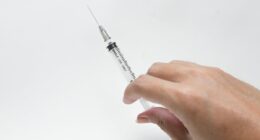
High blood pressure, sometimes called hypertension, rarely displays noticeable symptoms. But this is an added scare as high blood pressure increases your risk of developing serious conditions like heart attacks or strokes. In the UK, around one third of adults have high blood pressure, according to the NHS, although the organisation says many don’t realise it right away. Everyone’s blood pressure will be slightly different, and what’s considered low or high for you may be normal for someone else. The only way to check if your blood pressure is high is to have it tested, something everyone should be doing often.
Salt
Salt, or specifically the sodium in salt, is a huge contributor to high blood pressure and heart disease.
Table salt is about 40 percent sodium, of which you’re recommended to eat about one teaspoon a day with high blood pressure.
These foods are a major contributor to daily salt intake:
- Breads and rolls
- Pizza
- Sandwiches
- Cured meats
- Soup
READ MORE: High cholesterol: The top three sandwich spreads to help lower it
Processed meats
Processed and deli meats are often packed with sodium as manufacturers cure, season and preserve them with salt.
Even the ones dubbed ‘low salt’ tend to be pretty high in sodium, so try and avoid if you can.
READ RELATED: Type 2 diabetes: A food type which is known to absorb cholesterol and lower blood sugar
A diet high in salt can upset the normal balance of sodium in your body, leading to fluid retention and subsequently a higher blood pressure.
According to figures from Action on Salt, reducing your sodium intake from 10g a day to 6g could reduce your blood pressure. It could result in a 16 percent reduction in stroke deaths and a 12 percent reduction in coronary heart disease deaths.
Alcohol
Too much alcohol can increase your blood pressure drastically, so don’t be surprised if you’re recommended to cut back on the booze.
Alcohol can also prevent any blood pressure medication you may be taking from working properly through drug interactions.
In addition, many alcoholic drinks are high in sugar and calories, meaning too much of it can contribute to obesity, which in turn increases the risk of hypertension.
If cutting back on alcohol is a difficult feat for you, talk to your GP or doctor about what your options are.
Source: Daily Express









